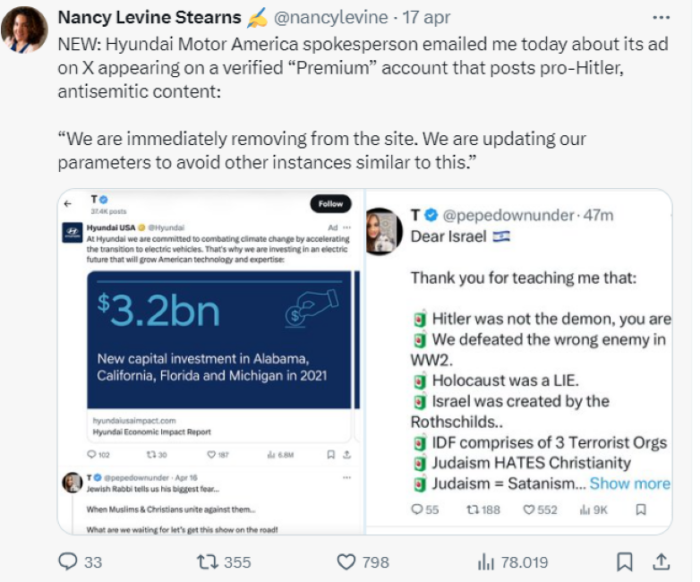by Pancrazio Anfuso
Nancy Levine Stearns, an American freelance journalist, posted on X, the social network commonly known as Twitter, a screenshot showing a screenshot of an anti-Semitic and pro-Nazi tweet from a verified Twitter account. Besides the offensive tweet, which was picked up in an investigation by CNN, there was a paid advertisement from Hyundai. A spokesperson for the Korean multinational immediately responded by announcing that it had suspended advertising on X, to avoid associating the brand with similar issues. X then announced that he had suspended the profile in question.

Elon Musk took over Twitter in 2022, for a small amount of 44 billion dollars. Since then, the controversy over the change of the popular social platform has never decreased: from frequent changes of address, such as a change of name or establishment for some paid features, such as the right to a verified account, a sign of authority , (blue check) to get which is now enough to pay for the subscription to the provocative offers of the South African-Canadian-American billionaire. Last but not least, and closely related to the issue, is the appreciation of the position that supported the false theory of radicalism according to which there are Jewish conspiracies aimed at reducing the number of white people in the West.
An NBC investigation revealed that there are at least 150 paid profiles on X that provide neo-Nazi and anti-Semitic content. Hyundai joins other companies that have announced a suspension of advertising on social media to avoid being associated with this type of content and the widespread culture of hate speech that plagues the web. Among others, IBM, Apple and Paramount.
The story recalls that of an international car company that in 1994 challenged Tripod, an American web hosting company, over a billboard that appeared to be linked to a web page that praised anal sex. Popular pop-up windows, invented by Ethan Zuckerman, who recently apologized for creating an ineffective system that made navigation difficult for millions of Internet users, had to close invasive windows and set up tools capable of blocking unwanted advertising attacks.
The case involving Hyundai is even worse, because it brings the issue of conversation control back to the center of attention, which is currently in the hands of a few very rich American companies, who have, in effect, monopolized the Internet, and imposed it. often strange rules, and advertising models based on user information, the real business behind their great wealth.

























